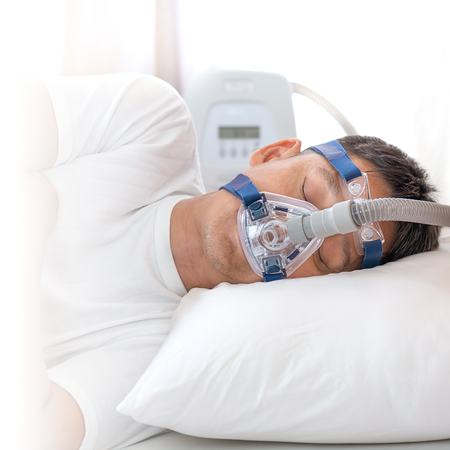Sleep apnea is a common but sometimes overlooked health problem. Although it occurs at night, it also has an impact during the day.
What is sleep apnea?
Sleep apnea is characterized by pauses in breathing during sleep that can last from 10 to 60 seconds and occur several times per hour. These pauses reduce the amount of oxygen in the blood. Furthermore, carbon dioxide is no longer eliminated as efficiently, its concentration in the blood increases, causing drowsiness.
Obstructive sleep apnea is the most common form. It is caused by a blockage that prevents air from getting to the lungs due to:
- relaxed tissue at the back of the throat
- enlarged tonsils, and
- a large tongue
Sleep apnea can affect men, women, and even children. That said, the people most at risk are:
- men
- elderly people
- obese people
- people with a large neck, recessed chin or narrow face
- smokers
- people with respiratory allergies
- people who consume alcohol
- people taking morphine derivatives, sleep aids or muscle relaxants
If you have sleep apnea, pharmacists can review your medication and suggest safe treatment options if they believe a medication may be contributing to the problem. They can also suggest medications to effectively treat your respiratory allergies and nasal congestion, if applicable. Don't hesitate to speak to them!
What are the symptoms of sleep apnea?
Sleep apnea symptoms are numerous and can vary from one person to another:
- breathing pauses
- snoring
- frequent awakening during the night
- non-restorative sleep
- fatigue upon awakening
- drowsiness during the day
- decreased energy
- irritability, nervousness, and anxiety
- depressed mood
- headaches upon awakening
- memory problems
- concentration problems
- decreased libido
- erectile dysfunction
People with sleep apnea rarely present all of these symptoms. If it is untreated, sleep apnea can lead to complications such as high blood pressure or cerebrovascular accident (CVA or stroke). These individuals are twice as likely to suffer from depression.
How is sleep apnea diagnosed?
Most people who have sleep apnea don’t know it. A spouse's input is key, as they are often the first person to notice breathing pauses during the night. Sleep apnea is a serious but treatable condition. Therefore, it is important to see your doctor if you have any doubts.
The diagnosis is based on a specialized test called polysomnography or a sleep study. It is the gold standard test or the best method of examination available. This method consists of placing electrodes or sensors on certain areas of the body to measure several parameters during sleep, including the following:
- eye movement
- muscle tone
- brain waves
- heart activity
- breathing effort
- oxygen levels in the blood, and
- leg movement
Must I make some lifestyle changes?
Adopting a healthy lifestyle is beneficial to control sleep apnea.
Quitting smoking is crucial. Cigarette smoke:
- irritates your throat and airways
- increases mucus production, and
- causes coughing at night.
All of this can make your sleep apnea symptoms worse. Pharmacists are valuable allies in the smoking cessation process, both for their advice and for prescribing an effective treatment.
Healthy eating and exercise will help you lose weight, which will reduce airway blockage. If you exercise at the end of the day, it should be at least three hours before going to bed. Vigorous exercise before bedtime can disrupt sleep.
A regular sleep schedule improves sleep quality. Sleeping on your back can cause airway blockage. Get into the habit of sleeping on your side. If this position is not natural for you, place a pillow behind your back for support, or between your knees.
Caffeine consumption (coffee, tea, cola) increases the time it takes to fall asleep and can also disrupt your sleep during the night. Therefore, its consumption should be limited. To help you sleep better, avoid consuming caffeine within six hours of bedtime.
The same precautions apply to alcohol. It can cause your throat and neck muscles to relax, leading to a blocked airway. It can also affect your brain, which becomes less efficient at detecting a lack of oxygen. This directly increases the frequency and severity of breathing pauses.
How is sleep apnea treated?
In severe cases of sleep apnea, these measures will not be sufficient. Other options will be evaluated by your doctor, including:
- a continuous positive airway pressure (CPAP) machine
- an oral device
- surgery
The best treatment for obstructive sleep apnea is the use of a CPAP machine. This device pushes air into the airway continuously and constantly to keep it open. The affected person must sleep with a mask connected to the device by a tube. An adaptation period is necessary to get used to sleeping with the mask. Additionally, problems with mask adjustment may occur at the beginning of treatment. Different types of masks are available depending on your preferences and morphology. It is necessary to use the device all night long for four to six weeks before an improvement of your symptoms is noticed.
The oral appliance is used to displace and hold the jaw and tongue towards the front of the mouth to keep the airway open. This appliance is used for mild to moderate cases of sleep apnea. Lastly, some surgeries can be performed to control snoring by removing the uvula and part of the soft palate.
Don’t hesitate to speak to your pharmacist for additional information about sleep apnea.

